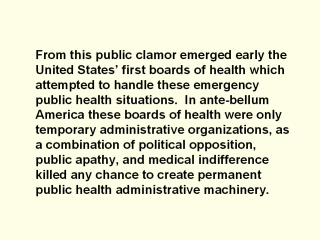 |
These early boards
of health were comprised of the mayor, his council, and a physician or
sanitary engineer, whose views were often ignored because they would cost
governments funds to implement, thus calling for increased taxes. Thus when
an epidemic struck, such as the 1832-34 cholera epidemic in most major
American cities, a board of health was quickly formed, it functioned during
the emergency, and then dissolved with the return to normalcy. The impact of
an epidemic on a city cannot be overstated. This quote from a 1849 St. Louis
newspaper illustrated the calamitous conditions caused by an outbreak of
cholera in that city. |
